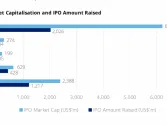
Asian Liquidity Stress Index slipped to 23.9% in June
It declined for 2 months in a row.
In a report, Moody's Investors Service says that its Asian Liquidity Stress Index (Asian LSI) declined for a second consecutive month to 23.9% in June from 25% in May.
"The index's June decline reflects a net decrease, to 27 from 28, in the number of companies with our lowest (weakest) speculative-grade liquidity score (SGL-4)," says Laura Acres, a Moody's Senior Vice President.
"The LSI has held in a tight and elevated range since it hit its recent high of 29.1% in October 2012. The current reading is below the record high of 37% reached during the fourth quarter of 2008 amid the global financial crisis, but it is far above the November 2011 all-time low of 9.0%."
Acres was speaking on the release of Moody's latest "Asian Liquidity Stress Index" report.
The liquidity sub-index for Chinese speculative-grade companies also declined in June, to 28.8% from 31.0% in May, as one Chinese company exited the list of those with an SGL-4 score and the number of rated Chinese high-yield corporate rose by one to 59, says the report. China's high-yield property index decreased to 29.4% from 31.4% in May for the same reason.
Indonesian corporate liquidity remains stronger than the other Asian-based sub-indexes because Indonesian issuers have been able to access the
domestic and regional bank markets to arrange committed, term funding. 2013 has also seen Indonesian corporates make a return to the cross-border bond markets.
Meanwhile, the Australian liquidity sub-index also fell, to 6.7% in June from 7.1% in May. The number of Australian companies with an SGL-4 score was unchanged at one.
The report says the number of high-yield rated bond issuances dried up in June after a strong start earlier this year. Two of the month's three bond deals were postponed.
Despite the lack of issuance in June, the first six months of 2013 have been a record for the Asian high-yield bond markets.















